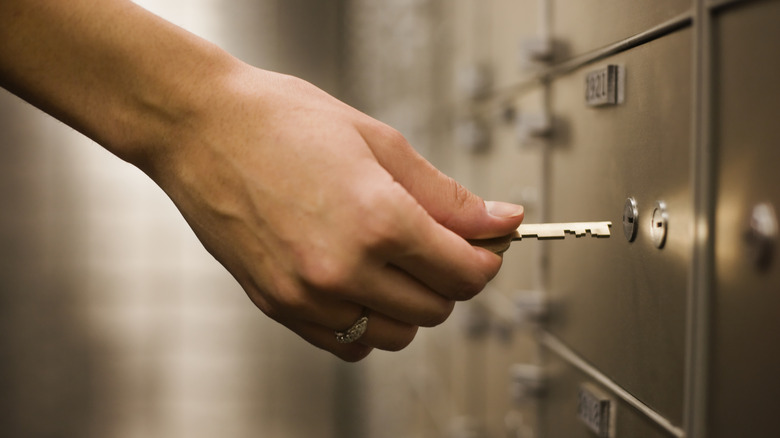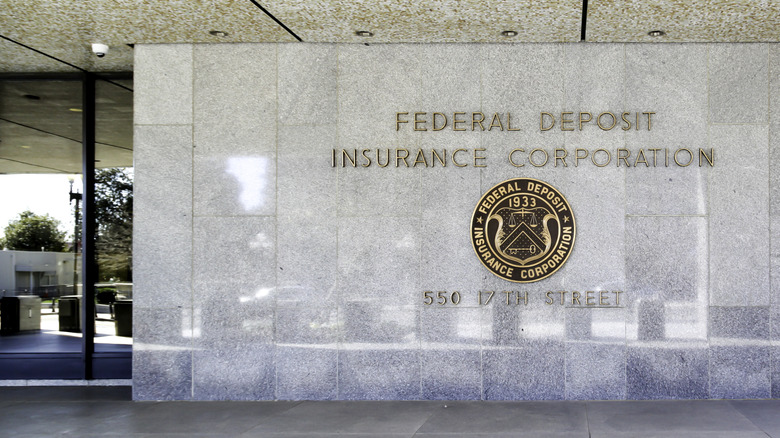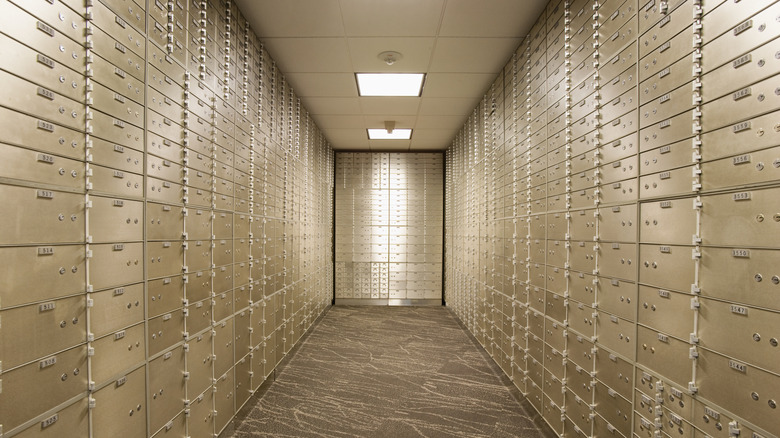Safe Deposit Boxes Have An Unsettling Truth Banks Don't Want You To Know About
While movies and television shows have often glamorized the incredible security of safe deposit boxes and/or vaults in banks, the truth could be a little less concrete (or, rather, less reinforced steel). For starters, safe deposit boxes are generally seen as relatively affordable options for anyone looking to safely store any particularly important or high-value items outside of their home. Some consumers might even be able to find discounts on safe deposit box fees through their existing banks. Most of the time safe deposit boxes are located inside of a bank's vaults (which more than likely features everything from alarms to cameras to locks). This is part of why these boxes are considered so well protected and, more importantly, safe. However, the consumer consequences for any kind of mishap with your bank's security can be high when it comes to safe deposit boxes. Beyond potential theft, natural disasters like fires, floods, and even earthquakes can also potentially affect the safety of your box and its contents.
So, while safe deposit boxes can definitely provide a certain sense of security, there are some significant downsides to be aware of before placing anything too important (or expensive) inside one. Namely, you could find yourself not only losing your box's contents, but also receiving no bank reimbursement afterwards (this is part of why you should avoid placing certain things in your box). This is due to the fact that safe deposit boxes lack FDIC coverage. Let's break down FDIC insurance, and other options available for consumers looking to protect their belongings.
Understanding FDIC insurance
An important factor when considering a bank is that they are FDIC insured. The reason this is so important is because the Federal Deposit Insurance Corporation essentially provides insurance on your money when you deposit it into an account with an FDIC-insured bank. This means that, even in the event of your bank's failure, your money (up to $250,000 at least) is protected. However, safe deposit boxes do not qualify. In a 2018 consumer news statement, the FDIC's Chief of Community Outreach, Luke W. Reynolds, explained that, "Cash that's not in a deposit account isn't protected by FDIC insurance." This means that, in the event of any damage or theft, your bank (and the FDIC) have no obligation to reimburse you for what you might have lost.
This also applies to any items you might keep in a safe deposit box besides cash. Jewelry, family heirlooms, and even important documents are ultimately not protected in the event of an accident. Plus, if the deposit box's owner should die without providing their bank a clear plan, gaining access to the safe deposit box could revert to whatever the state law is where the box is located. This could add complications for those trying to access the box's contents. Another important consideration? Reynolds added that, "unlike money in a savings account, money in a home safe or safe deposit box cannot earn interest, so the purchasing power of your cash will decrease."
Other considerations for consumers
Now, despite the potential for losing your goods, and their value, in the event of a theft or natural disaster safe deposit boxes can still ultimately be the safest option available to you. Like with many other things in life, you have to assume that the likelihood of something extreme happening to your bank is probably slim. With that in mind, it can still be worth pursuing additional insurance options for your safe deposit box items. Many insurance providers (like the ones you might already use for your homeowner's or renter's insurance) have specialized coverage options for either safe deposit boxes or even at-home safes that can be added to existing policies.
Also, when deciding on the kinds of items to place into your safety deposit box, it can be important to remember one specific rule. As Simon Zhen, chief research analyst at MyBankTracker.com explained to U.S. News & World Report, "The general rule is to protect documents that are difficult to replace, but you don't need to access them regularly." This means prioritizing things like birth certificates, car titles, and legal documents over cash. With that in mind, it's important to note that actually finding a physical safe deposit box could be more difficult than you think. With the rise of digital banks (that don't even have brick-and-mortar locations) and the increased cost of real estate, fewer banks offer boxes than they used to. In fact, big banks like Chase and Capital One have stopped offering safe deposit boxes to new customers altogether.


